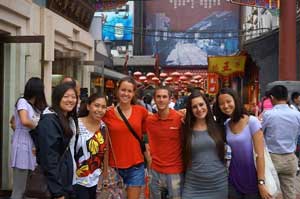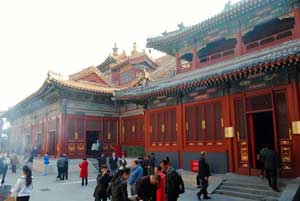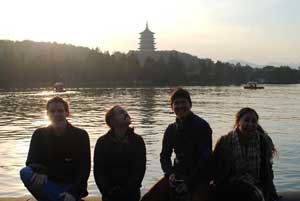
What made this study abroad experience unique and special?
Elizabeth: What made my experience studying abroad so exceptional was the people I met overseas. I am a naturally shy and reserved person and going abroad forced me to leave my comfort zone and meet people. I met both American students from all over the U.S as well as Chinese people from different parts of China.
At times, it took a while for me to bond with some of my fellow students, but I know that I have made lasting friendships thanks to my time abroad. In addition, the courses I took were interesting and I learned a lot, especially about the Chinese language and culture.

What was the best place you visited outside of your study abroad city?
Elizabeth: During one of our long weekends, a couple of my friends and I visited the city of Hangzhou, which is located in Zhejiang province and is known for its beautiful scenery.
There’s a saying, “上有天堂,下有苏杭”, which means the beauty of Suzhou and Hangzhou are comparable to heaven. Hangzhou was a great place to visit because it was a nice change of scenery from Beijing. Hangzhou is a much smaller and more manageable city than Beijing, quieter and less polluted. The trip also was a great opportunity to bond even further with my friends, whom I had met through the IES program.
What is one piece of advice you'd give future IES Abroad students?
Elizabeth: Explore. I feel that I can’t stress this enough. There’s so much to see in China and there’s no shortage of things to do, so make the most of your time while you are there! I enjoyed exploring the city when I had spare time.
I was easily able to visit museums, markets, parks, etc. either by myself or with fellow students. IES encourages students to travel and, therefore, provides two long weekends to travel, even if it’s just to the province next door. This is in addition to a two-week mobile learning trip that students go on at the beginning of the semester.

Recall a time when your education and experience didn't prepare you for a situation abroad.
Elizabeth: I was adopted from China as an infant, so, until they heard me speak, most people in China were not able to tell that I had been raised in the United States. The IES staff mentioned that, for Western students of Chinese heritage studying in China, they might encounter different situations than their classmates. In the event that something does happen, the advice given from IES is too laugh it off, which I think is excellent advice and applicable for any given situation.
On one occasion, I was mistaken for a hotel employee and, although I repeatedly told the person that I did not work in the hotel and could not help him, he still expected me to solve his problem. Although I expected to be treated differently from other Western students, it wasn’t until this moment that I really understood what the IES staff were talking about.